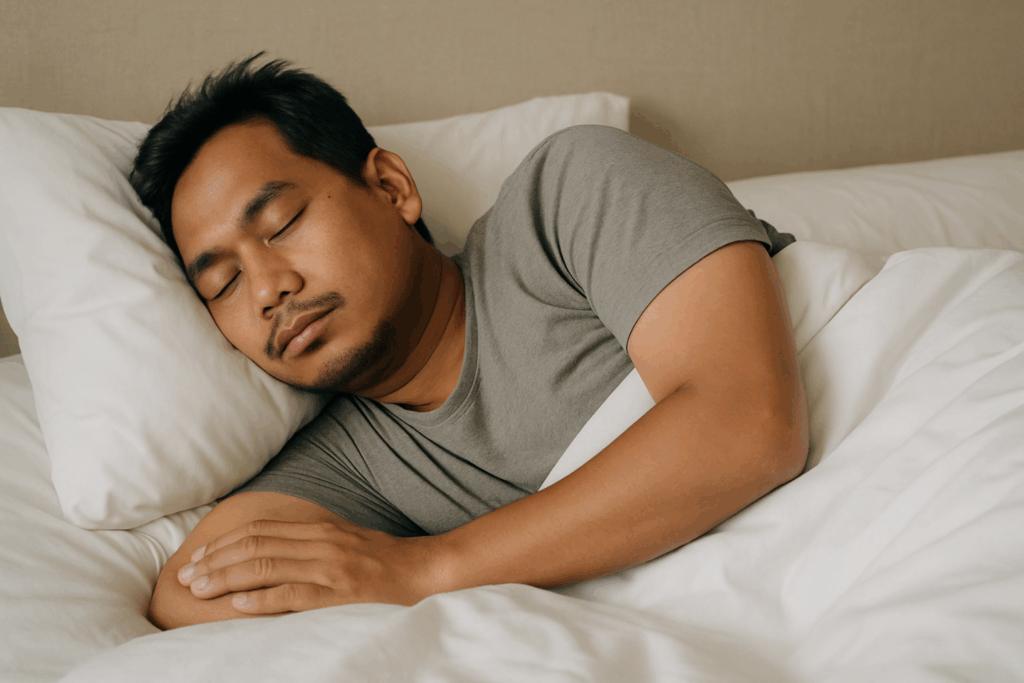Getting good sleep isn’t just about rest. It’s when your body gets to work, repairing tissues, rebalancing hormones, and recharging your energy. For men—especially after 30—sleep and testosterone are tightly linked. If you’re not sleeping well, your hormones can fall out of balance. And when your hormones are off, good sleep gets harder to come by.
At Boost Health Clinic, we see this cycle often. Men complain to us about fatigue, low energy, trouble sleeping, and declining drive. And behind many of those symptoms? Disrupted hormone levels like testosterone.
What Happens to Your Hormones When You Sleep
Sleep triggers a chain of hormonal activity. While you’re resting, your body is working to regulate testosterone, cortisol, melatonin, and more. These hormones manage everything from energy and mood to stress and metabolism. When sleep is cut short or broken up, that entire system gets thrown off.
Testosterone and Sleep: A Two-Way Street
Most of your testosterone is made while you sleep—especially during the deep and REM stages. Missing even a few hours can have a noticeable effect.
One study found that sleeping just five hours a night for a week dropped testosterone levels by up to 15%. That’s enough to cause real symptoms: low energy, weaker libido, irritability, and slower recovery after workouts. (1)
Testosterone is usually at its peak early in the morning. But if you’re not getting solid sleep, those levels may never rise where they should.
Cortisol: The Hormone That Won’t Let You Rest
Cortisol is your body’s main stress hormone. It should rise in the morning and gradually drop as the day goes on. That pattern helps you wake up, stay focused, and wind down. (2)
But when you’re under constant stress—or not sleeping well—cortisol can stay elevated at night. That can lead to restless sleep, trouble falling asleep, and waking up groggy no matter how long you were in bed.
Too much cortisol at night keeps you from getting into deep sleep, the stage where your body truly recovers. It can also contribute to weight gain, higher blood sugar, and high blood pressure.
Melatonin: Your Sleep-Wake Clock
Melatonin tells your body it’s time for bed. It starts rising in the evening as the sun goes down and peaks overnight. But artificial light—especially from phones and screens—can block melatonin production. So can staying up too late or having an irregular schedule.
If your melatonin rhythm is off, you might have trouble falling asleep or staying asleep, and you’ll likely miss out on the deeper stages of rest.
Other Hormones That Matter at Night
Testosterone, cortisol, and melatonin get most of the attention, but they’re not alone.
-
Growth hormone: released during deep sleep, helps with muscle repair and fat metabolism
-
Insulin: poor sleep affects how your body processes sugar, increasing the risk of weight gain and type 2 diabetes
If you’re consistently tired or not recovering like you used to, there’s a good chance hormones are involved.
Low Testosterone Disrupts Deep Sleep
Low testosterone doesn’t just cause daytime problems—it affects your sleep, too. Men with low T often struggle with insomnia, wake up more often during the night, and don’t feel rested in the morning.
The deeper phases of sleep—slow-wave and REM—are where the body repairs and resets. Men with low testosterone spend less time in those stages and more time tossing and turning. Even if you’re in bed for 8 hours, you may not feel refreshed.
Low T is also tied to sleep apnea, a condition that interrupts breathing during sleep. That makes restful sleep even harder to get. On top of that, men with low testosterone may feel more anxious or irritable, which makes winding down at night a challenge.
In many cases, testosterone replacement therapy can help. At Boost Health Clinic, men who begin treatment often report better sleep, improved focus, and more consistent energy throughout the day.
When to Suspect Hormones Are Behind Your Sleep Problems
Sometimes it’s obvious. Other times, it sneaks up. If you’re dealing with any of the following, it might be time to get your hormones checked:
-
You feel exhausted even after a full night’s sleep
-
You wake up several times a night
-
Your sex drive has dropped or you have an erectile dysfunction
-
Your mood feels off—low, anxious, or irritable
-
You’ve started gaining weight or losing muscle
Individually, these can be brushed off. Together, they’re often signs your hormone balance needs attention.
How to Improve Sleep and testosterone Health
You don’t need a full lifestyle makeover to sleep better. Start with a few small habits:
-
Stick to a schedule: Wake up and go to bed at the same time every day
-
Unwind before bed: Avoid stress, loud noise, and heavy meals
-
Cut down screen time: Blue light blocks melatonin—turn off devices an hour before bed
-
Work out earlier: Morning or afternoon exercise supports testosterone and reduces cortisol at night
-
Treat underlying issues: Conditions like sleep apnea or hormone deficiencies need medical attention
If your symptoms point to low testosterone or high cortisol, a blood test can give clear answers. At Boost Health Clinic, we make testing quick, discreet, and affordable.
The Hormone–Sleep Loop: Break the Cycle
Poor sleep affects your hormones. And when your hormones are off, good sleep becomes harder. It’s a feedback loop—and the longer it goes on, the harder it gets to break.
The good news? You can turn it around.
By understanding how hormones shape your sleep, you can take steps to fix the root cause—not just mask the symptoms. Whether it’s lifestyle changes, medical testing, or testosterone therapy, there are options that work.
If you’re tired of waking up tired, Boost Health Clinic is here to help. Book a hormone test today and take the first step toward better rest, better health, and better days.

